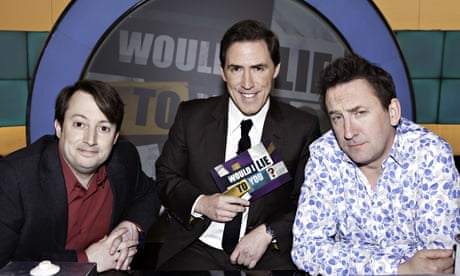Danny Cohen, head of the BBC's television output, has promised viewers that the corporation will not make any more all-male comedy panel shows.
Following recommendations made by the BBC Trust last year, Cohen has underlined his determination to see women appearing in the habitually macho environment of panel shows such as QI and Mock the Week. Talking to the Observer about his plans for better representing his audiences on screen, Cohen said: "We're not going to have any more panel shows with no women on them. It's not acceptable."
Cohen, who ran BBC1 until last spring and before that was the controller of digital channel BBC3, also said he had work to do to make sure there are more older women featuring in the corporation's television programmes.
"We are getting better," he said, pointing to the high-profile example of historian Mary Beard. "But we need to do more."
A BBC spokesman said that while it is possible that some panel shows recorded several months ago may still appear without a female team member or chairperson, every episode recorded from now on will include at least one woman.
"There may be very rare occasions where shows that were already recorded – or whose panels were already booked ahead of the order – still have all-male line-ups, but hopefully the change should really become apparent," the spokesman said.
In December, BBC management told programme producers there was "no excuse" for not having women on comedy panel shows after new sex-representation objectives were set by the BBC Trust. In July last year, the Trust asked BBC director general Tony Hall to get more women on air "as a matter of urgency" throughout 2013-14.
Panel shows were immediately chosen by Cohen as a priority and a problem that would be relatively straightforward to address. In-house and external producers were told to ensure that panel shows and quizzes involved at least one woman.
The BBC's entertainment controller, Mark Linsey, said that such programmes would be improved by the mix of sexes. "I'm making it clear to production teams that there's just no excuse for delivering all-male guest lists," he said.
The initiative followed the publication of a document commissioned for the Cultural Diversity Network in 2012 which had singled out the panel shows QI and Mock The Week for "rarely having women represented".
Attention focused on the issue in 2009, when Victoria Wood complained to the Radio Times about the "testosterone-fuelled nature" of such shows. "A lot of programmes are very male-dominated, because they rely on men topping each other, which is not a very female thing," she said.
Wood's words were echoed by Jo Brand, who said she no longer considered appearing on Mock The Week. "And neither do some male stand-ups I know," she said. "We didn't like the prospect of having to bite someone's foot off before they let us say something."
Television producers have argued that women often turn down the more competitive shows and Brand agreed that there are hefty disincentives, including the fears that they might not get a word in or may be edited to look stupid.
Brand said that QI, the general knowledge quiz show on BBC2, gave contributors more time to think and was less aggressive, but added that women were used as "window dressing" on shows such as Never Mind the Buzzcocks and were frequently ridiculed on They Think It's All Over and Have I Got News For You.
Kate Kinninmont, chief executive of Women in Film and Television, a group for women working in the industry, said last year that several of these shows had made progress: "People said for years there are no funny women and it was a struggle to get women on shows like Have I Got News for You. But that has improved, as has the number of women on Question Time."
Mock The Week is repeatedly cited as the worst offender. The topical show has an all-male line-up of regulars and series 12 managed to fill only five of 38 guest spots with female guests. Katherine Ryan and Holly Walsh appeared twice each, and Ava Vidal appeared once. Among other women to have braved the so-called bearpit of BBC panel shows are Ronni Ancona, Nina Conti and Sarah Millican.
Hugh Dennis, a Mock The Week regular, spoke recently about the armoury required by potential women guests. Millican, he said, had a kind of quiet confidence that allowed her to rise above the boyish banter. "She kind of happily sits there sometimes and doesn't bother fighting fire with fire. She looks as if she is thinking, 'Oh you get on with it'. And then, when she says something, she does it brilliantly," he said.
While television sitcoms starring women are enduringly popular – even if, in the case of Mrs Brown's Boys, the woman is a man – Armando Iannucci recently called for more women to write comedy scripts.
But Brand highlighted a "practical problem" of supply and demand early on: "There are far more male comics than women. When I started, there were about 200 male stand-ups and about 20 female – roughly one woman for every two-and-a-half panel shows."











Comments (…)
Sign in or create your Guardian account to join the discussion